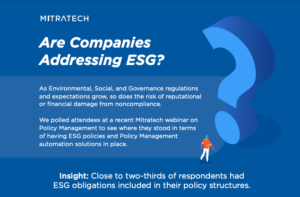Infographic: What’s the State of ESG Compliance?
We recently conducted a poll about the extent to which companies have adopted Policy Management to meet the rigorous standards of today’s compliance environment, especially around ESG.
As anyone in nearly every industry knows, the ever-increasing volume of regulatory and security demands can weigh heavily on an organization. Environmental, Social, and Governance (ESG) is helping change the way that companies manage their supply chain, developing more sophisticated risk management frameworks, and highlighting the importance of utilizing Third Party Risk Management (TPRM) capabilities.
As regulations, social responsibility, and security demands grow, the volume of work for your compliance team does too, coupled with rising costs. Taking risk into consideration becomes a top priority; beyond the costs of fines caused by non-compliance, there’s the danger of damaging your reputation in the public eye (and it isn’t easy to bounce back from that).
As our panel of experts explored how Policy Management technology can help an enterprise meet these significant and increasing challenges, we polled our audience to glean some insights into the state of their policy management. You can see the results in detail in this infographic.
Insights from the webinar
There were two main questions we found the answers particularly intriguing to. First, we asked our listeners: Are ESG obligations included in your policies?
Insight: Close to two-thirds of respondents had ESG obligations included in their policy structures.
Surprisingly, only 18.5% reported that their organizations had specific ESG policies in place. An additional 44.6% answered that their ESG obligations were incorporated into other existing policies. Another 36.9% said they had no ESG obligations included in their policies at all.
The second question we asked was: Do you have policy automation software for policy creation, user attestation and reporting in place?
Insight: Nearly two-thirds do not have a Policy Management automation solution in place to help streamline ESG compliance.
10.7% said they had full Policy Management automation; 25% reported partial policy automation implemented, but 64.3% had no automation in place.
One of the reasons these numbers are so low (particularly with having specific policies in place and full automation in effect) may be because organizations don’t fully understand the significance and value it can offer. According to a report by McKinsey, an analysis of over 2,000 studies on the impact of ESG propositions on equity returns found that 63% had positive findings.
Policy management can increase your operational efficiency, help you build an ethical and defensible compliance program, and help you mitigate risk early, reducing the chances of heavy penalties.



